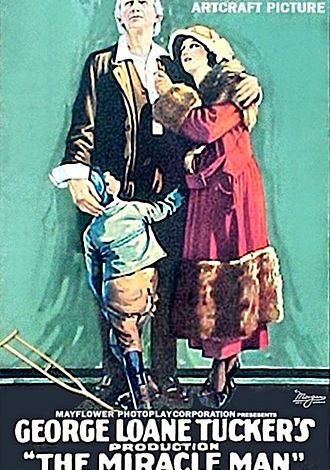The Miracle Man

The Miracle Man is a 1919 American silent drama film starring Lon Chaney and based on a 1914 play by George M. Cohan, which in turn is based on the novel of the same title by Frank L. Packard. The film was released by Paramount Pictures, directed, produced, and written by George Loane Tucker, and also stars Thomas Meighan and Betty Compson. The film made overnight successes of the three stars, most notably putting Chaney on the map as a character actor.
Paramount remade the film in 1932 also titled The Miracle Man with Hobart Bosworth, Chester Morris, John Wray, and Sylvia Sidney. Today, the majority of the 1919 film is considered lost, with only two fragments, totaling about three minutes, surviving.[2]
The film takes place in a small, New England town in 1919 (the Broadway play 1914), where a group of con men plan to use a faith healer to collect money.
In New York City’s Chinatown, four crooks conspire to swindle a small New England town. The gang consists of Tom Burke (Thomas Meighan), the head of the group; Rose (Betty Compson), a con artist posing as a street walker; “The Dope” (J.M. Dumont), who pretends to pimp Rose; and The Frog (Lon Chaney), a contortionist.
Betty Compson and Joseph J. Dowling in a scene with St. Bernard co-star.
The plan is clear: in a small town outside of Boston there is a Patriarch (Joseph Dowling) who has been healing people. The group heads to the town and plans to use the Patriarch in a faith healing scheme. When the townspeople gather to see the Patriarch heal the sick, the Frog is there, posing as a cripple. As he crawls to the path of the man, his limbs become straightened and soon he walks to the Patriarch, supposedly healed. Unexpectedly, a crippled boy, his faith in the Patriarch overpowering him, loses his crutches and runs to the Patriarch.
The story spreads across the country (mostly on account of Burke), and people flock in from all over to visit the Patriarch and be healed. When a millionaire, Richard King (W. Lawson Butt), brings his sister to be healed, he gives Burke $50,000 after the Patriarch cures her. During this visit, King meets Rose, and the two fall in love.
Meanwhile, all is not well with Burke. One by one, he sees his gang disbanding because, unbeknownst to him, the healing power of the Patriarch is at work. The Dope gives up his drug addiction, The Frog gives up his life of crime and takes care of a widow left all alone, and Rose laments King’s departure.
Burke becomes jealous, but when King returns to propose marriage to Rose, she realizes that she loves Burke. The Patriarch dies, and the two lovers begin anew.
